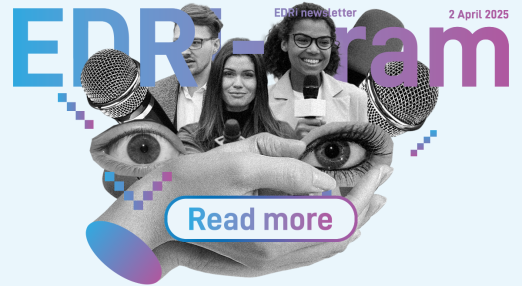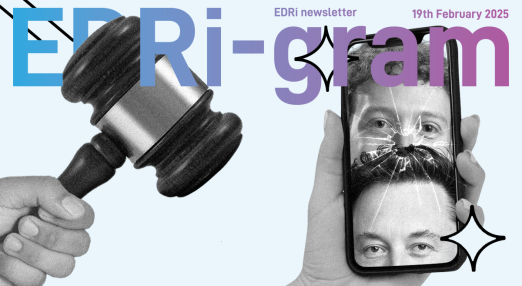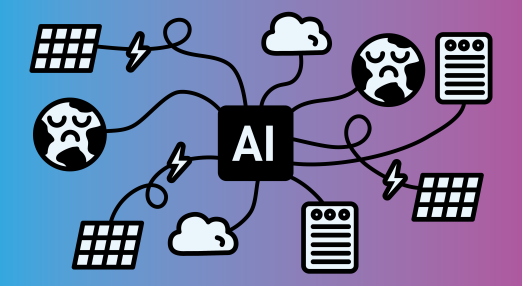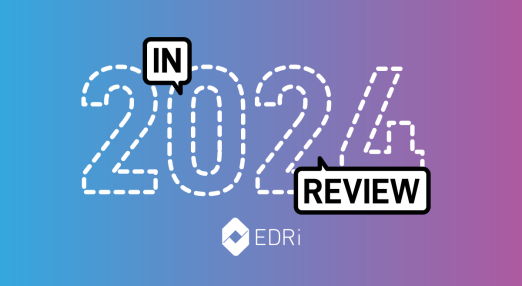Open internet and inclusive technology
New digital technology and the internet brought with it a promise of equal access to knowledge, openness and connection. Their ubiquity has brought opportunity for progress. However, access to digital technology is vastly unevenly distributed. Technology, especially when relying on artificial intelligence, location and biometric data, can amplify social, racial and environmental injustices. We work to bring back the original purpose of an open internet and enable inclusive, sustainable technologies that work for all and for the greater good.
Filter resources
-

Showing your ID to get online might become a reality – a closer look at the EU’s new age verification app
Coming to a website near you this summer: the European Commission is close to a ‘solution’ that could force people to use their government-issued ID to get online. EDRi and EFF’s concerns about threats to everyone’s privacy and data protection, a chilling effect on access to information, and digital exclusion – harming the already most marginalised in society - remain unsolved.
Read more
-

EDRi-gram, 16 April 2025
What has the EDRis network been up to over the past two weeks? Find out the latest digital rights news in our bi-weekly newsletter. In this edition: Challenging data retention regime in Poland, Ljubljana’s municipal surveillance, and more!
Read more
-

EDRi-gram, 2 April 2025
What has the EDRis network been up to over the past two weeks? Find out the latest digital rights news in our bi-weekly newsletter. In this edition: DSA complaint X, New civic coalition for journalists and civil society, imagining EU-topia, & more!
Read more
-

Utopian dreams, sobering reality: The end we start from in EU’s approach to technology
We imagine a day in the near-future, when EU lawmakers commit to building a world where people, our planet, and democracy flourishes – and heed to civil society’s long-standing collective demands to achieve this. But in reality, we seem to be getting farther and farther away from this utopian scenario, and are preparing for a sobering next few years in the EU tech policy space.
Read more
-

EDRi-gram, 5 March 2025
What has the EDRis network been up to over the past two weeks? Find out the latest digital rights news in our bi-weekly newsletter. In this edition: Our call to reject the Europol reform, UK and France launch fresh attacks on encryption, & more!
Read more
-

EDRi-gram, 19 February 2025
What has the EDRis network been up to over the past two weeks? Find out the latest digital rights news in our bi-weekly newsletter. In this edition: Commission withdraws ePrivacy proposal, new database to track investigations into Big Tech, & more!
Read more
-

EDRi-gram, 5 February 2025
What has the EDRis network been up to over the past two weeks? Find out the latest digital rights news in our bi-weekly newsletter. In this edition: Don’t let Big Tech bully the EU, Commission’s AI Act guidelines should center human rights, & more!
Read more
-

The mirage of EU techno-solutionism to the climate crisis
Technology, as shaped by today’s market-driven priorities, carries immense hidden environmental and social costs. The tech sector is one of the fastest-growing contributors to waste and energy consumption. In 2021, it was responsible for two-to-three percent of global carbon emissions — on par with aviation.
Read more
-

EDRi-gram, 22 January 2025
The EDRi-gram is back after the winter break and yes, we missed you too. Before we dive into the new year, we have a review of 2024 for you. From stopping Chat Control to hosting the first-ever Tech and Society Summit, read up on what kept EDRi so busy last year. In this edition, also catch-up with some important developments from the end of 2024 which are bound to pop up again on the digital rights radar soon. The infamous High Level Group Going Dark presented their "insecurity by design agenda". So don’t be surprised if EU politics sees another iteration of flawed proposals on data retention and circumventing encryption. Ugh. Meanwhile, the European Commission presented their proposal for digitalising travel documents. “Didn’t they promise that for the third quarter of 2023,” you say? Indeed, but after the initiative received a devastating amount of negative feedback, it took more than a year for the adjusted EU travel app proposal. We provide an extensive analysis of the (so far) voluntary system for pre-travel controls. For our more masochistically inclined readers, we take a look over to the US and how corporate social media such as Meta and X align with the new administration. Recent changes to content moderation policies empower far-right extremists and expose marginalised and minoritised communities to hate speech.
Read more
-

Why EDRi is leaving X and where to find us
Since Musk’s acquisition of X in October 2022, we have been working towards an exit strategy. Recent developments and Musk becoming part of the second Trump administration have contributed to a unique and toxic platform power-grab, which has accelerated our X-it timeline. EDRi is joining many other organisations and people in leaving X by the end of January 2025. On 20 January, we will host an important X Spaces conversation to encourage our followers to join Mastodon.
Read more
-

EDRi’s 2024 in Review
As we enter 2025, we look back on some of the biggest European digital rights developments, the laws passed, enforcement actions taken, and things to watch out for in the new year and the new EU mandate.
Read more
-

Dear Claire
With your decision to step down as EDRi's Executive Director in the summer of 2025, we celebrate your remarkable leadership during the past seven years. Your vision, resilience, and commitment to digital rights have shaped EDRi into the robust and well established network organisation it is today.
Read more
